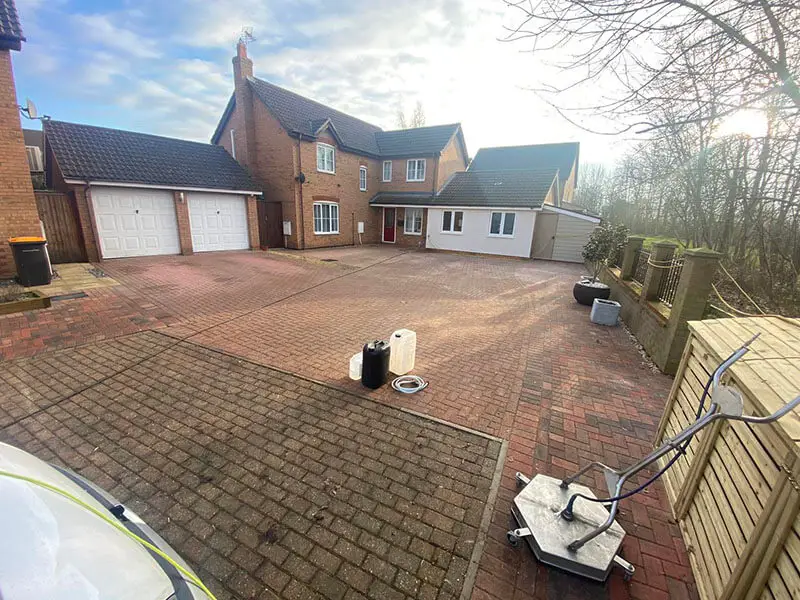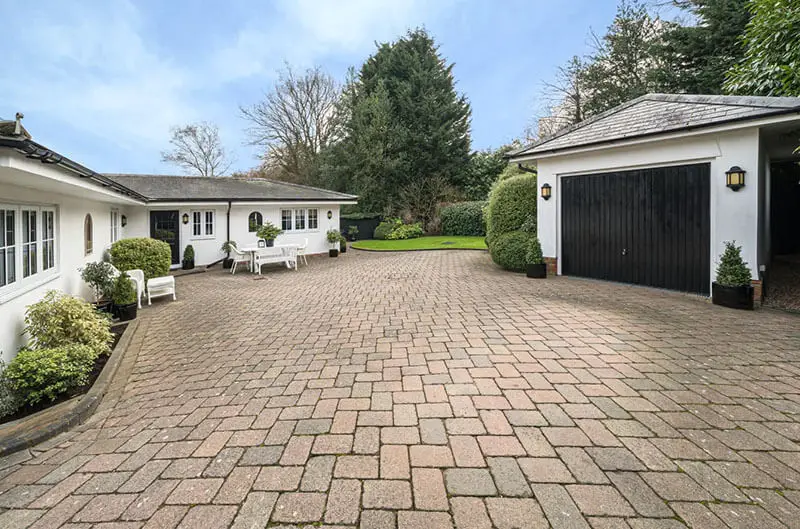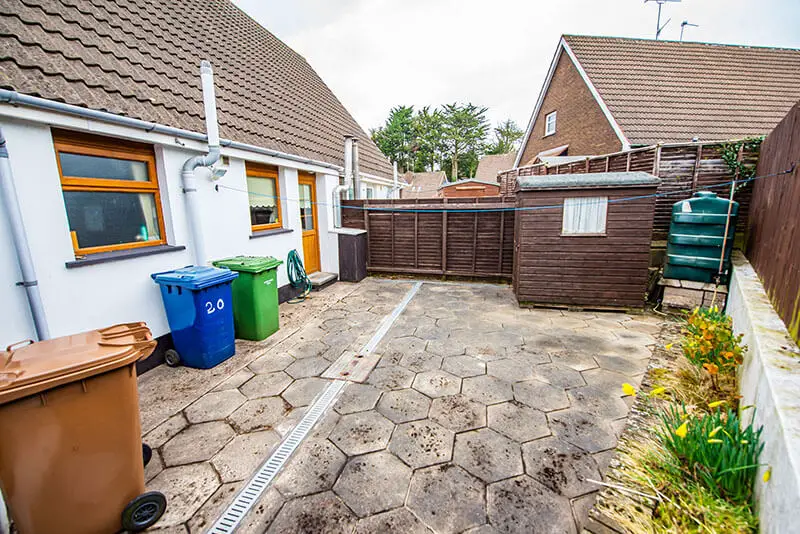I was painting my roof two months ago, and some of the paint was left. I thought I should use it to paint on my paving as it needed some paint too. But little did I know that it’s not recommended to use any kind of roof paint on any kind of paving.
Because just after the painting, I realized It was pointless as they started flaking and were not good enough for my paving. Besides, it got slippery, and I worried my kid might get there and hurt herself. And it took me hours to take that off.
So, to answer your question, you can’t use roof paint on paving unless you have products specifically formulated for paving. And, even if you want to use roof painting on paving, there are some specific roof paint you can use for specific paving.

| Paving Material | Roof Paint Options |
| Concrete Paving | Acrylic Concrete Roof CoatingConcrete dyes or concrete stains |
| Asphalt Paving | Asphalt Roof CoatingPaving Enamel |
| Brick Paving | Masonry PaintBrick StainsClear Sealers |
| Natural Stone Paving | Stone SealerStone-Specific CoatingsColor-Enhancing Sealers |
| Interlocking Concrete Pavers | Concrete and Masonry PaintPaver Paint |
Quick Jump
What Happens If I Use Roof Paint on Paving?
You see, roof paint is specifically designed for roofs with different requirements than paving surfaces. If you apply roof paint on your paving, you might face a few issues:
I will go through those issues one by one.
Issue #1: The first issue you will face is adhesion. Roof paint may struggle to adhere properly to the paving surface. Paving materials like concrete or asphalt have different properties compared to roofing materials. As a result, the roof paint may start peeling, flaking, or not cover the surface evenly.
Issue #2: As you already know, paving surfaces require protection against water damage, oil stains, fading, and other specific challenges they face. Roof paint is primarily designed to tackle weatherproofing and UV protection for roofs. As a result, using it on paving may not provide the level of protection needed for your pavement.
Issue #3: On another note, suppose you want to remove the roof paint from your pavement. In that case, be prepared for a tough and time-consuming process. Stripping the paint might require harsh chemicals or abrasive methods that could damage your paving.
Issue #4: Your safety is at risk! Roof paints may contain certain chemicals or additives unsuitable for surfaces intended for foot traffic. These substances could make your pavement slippery when wet, which poses safety hazards.
Issue #5: Nobody wants to lose money on doing the same things, such as repeatedly painting the pavement. Because, Paving surfaces are subjected to foot traffic, vehicle movement, and exposure to chemicals, which can be pretty harsh. Unfortunately, roof paint may not withstand much wear and tear. It might deteriorate quickly, leading to a shorter lifespan for the coating.
Lastly, everyone wants to look good. I don’t want my neighbor to see my pavement and say, “ew,” because applying roof paint on your pavement could result in an unnatural or mismatched appearance, which might not be what you aim for.
Specific Kinds of Roof Paint that You Can Use for Paving

You have already got an idea about different kinds of pavings and all kinds of roof paint or options you can use. In this section, I will go through all the options in detail so that you can understand if you can paint on your paving.
Concrete Paving
As you already might know, you can use acrylic concrete roof coating and concrete dyes or concrete stains for your concrete paving.
Here are the reasons;
Let’s say you have a concrete patio or walkway that needs some sprucing up. In that case, Acrylic Concrete Roof Coating can be a great choice because it is a water-based paint specifically formulated for concrete surfaces, offers excellent adhesion to concrete, and provides protection against UV rays, water damage, and general weathering.
And as for the Concrete Dyes or Stains, they are designed to penetrate the concrete surface, providing color while preserving the natural texture and variations of the concrete. They offer a translucent or semi-transparent finish, enhancing the appearance of the concrete.
Asphalt Paving
As for asphalt paving, you can use Asphalt Roof Coating and Paving Enamel. These are great options for a commercial storefront with a concrete entrance.
Asphalt differs slightly from concrete, so using the right paint ensures good adhesion, durability, and protection.
That’s why using Asphalt Roof Coating is a good choice, as it is engineered to have excellent adhesion to asphalt surfaces, ensuring a strong bond that can withstand the demands of weather and foot traffic, allowing it to adhere effectively to asphalt roofs and paving, providing long-lasting protection.
Besides, it can also offer excellent weather resistance, protecting your asphalt surface from the harmful effects of UV rays, extreme temperatures, and moisture. And with that, using Paving enamel provides a durable coating that can withstand light foot traffic, vehicle tires, and exposure to elements.
Brick Paving
When selecting paint for brick paving, it’s important to consider the porosity of the brick, the desired finish, and the level of protection required.
Masonry paint offers a solid, opaque finish and maximum protection. On the other hand, Brick stains provide a more translucent look, highlighting the brick’s natural characteristics. Clear sealers preserve the brick’s appearance while adding a protective layer.
Besides,
- These offer excellent adhesion and durability, protecting the brick from weathering, UV rays, and moisture.
- They can be a great choice for protecting and enhancing the natural beauty of brick paving.
- And they are designed to penetrate the brick surface, providing color while still allowing the natural texture and characteristics of the brick to show through.
Natural Stone Paving
It is a bit different for natural stoner paving than the other types because in the case of natural stone, such as slate, limestone, or granite, using the right products is crucial to protect and enhance the beauty of the surface.
As you know, you have three options.
These are perfect for your paving because;
- Applying a stone sealer is essential to prevent moisture penetration and potential damage. Stone sealers create a protective barrier on the surface, reducing the risk of water damage, staining, and color fading.
- Coatings are formulated to bond with the stone surface, providing added protection against weathering, UV rays, and foot traffic.
- Sealers penetrate the stone surface and enhance the natural hues, giving the stone a vibrant, saturated appearance.
Interlocking Concrete Pavers
Lastly, Interlocking concrete pavers are popular for driveways, walkways, and patio surfaces due to their durability and aesthetic appeal. When painting these pavers, it’s important to choose a paint that can withstand foot traffic, weather conditions, and the unique properties of the concrete material.
You have two options, concrete and masonry paint, and paver paint.
- These offer excellent durability and weather resistance, making them suitable for interlocking concrete pavers.
- These options are if you’re looking for superior durability and resistance to chipping, fading, and staining, ensuring a long-lasting finish.
Maintenance Practices to Keep the Paving Surface in Good Condition

Keeping the paving condition in good shape is as important as finding and using the right paint. Here, I will share some maintenance practices to keep your paving surface in good condition after applying roof paint.
- Of course, cleaning the surface to remove dirt, debris, and any spills regularly is crucial. Use a broom, leaf blower, or hose to remove loose dirt and leaves.
- Avoid harsh chemicals or solvents, which can deteriorate the paint’s durability.
- Prevent dragging or moving heavy objects directly on the painted paving surface, as this can cause scratches or damage to the paint.
- Periodically inspect the painted surface for any wear, peeling, or damage.
- Depending on the type of roof paint used, applying a sealant or topcoat may be beneficial to provide an extra layer of protection.
Wrap Up
I hope you won’t face any problem finding it difficult to determine if your left-out roof paint can be used in the paving surface. Even though I strongly recommend using the products specifically formulated for paving, you can use roof paint if you’re short on budget or for any other reason.
Besides, maintaining those maintenance tips will extend the paint’s longevity and appearance of your painted paving surface. Have a great day!

Roger Lewis is an experienced roof repair contractor with over 15 years of industry experience. He is known for his expertise in all aspects of roof repair, including leak detection, shingle replacement, and gutter repair.
